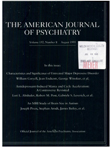Neuropsychological correlates of MRI temporal lobe abnormalities in schizophrenia
Abstract
OBJECTIVE: The authors evaluated the neuropsychological correlates of temporal lobe abnormalities in schizophrenic patients. METHOD: Fifteen schizophrenic patients underwent assessment of memory, by the Wechsler Memory Scale--Revised, and abstraction/categorization, by the similarities subtest of the Wechsler Adult Intelligence Scale--Revised and the Wisconsin Card Sorting Test. Neuropsychological tests of motor and constructional functions were used as control tasks. The patients also underwent magnetic resonance imaging (MRI) studies in which new neuroimaging techniques were used to derive measurements of volume and three-dimensional surface renderings of temporal lobe structures. RESULTS: Spearman rank-order correlations indicated significant associations between poor scores on tests of verbal memory, abstraction, and categorization and reduced volume in temporal lobe structures, including the parahippocampal gyrus and posterior superior temporal gyrus (left and right). By contrast, performance on tests of visual memory and on control tasks was not correlated with MRI temporal lobe abnormalities. CONCLUSIONS: These findings suggest a significant but modest relation between reduced volume in specific temporal lobe regions and neuropsychological deficits in abstraction, categorization, and verbal memory, all of which may reflect a dysfunctional semantic system in schizophrenia.
Access content
To read the fulltext, please use one of the options below to sign in or purchase access.- Personal login
- Institutional Login
- Sign in via OpenAthens
- Register for access
-
Please login/register if you wish to pair your device and check access availability.
Not a subscriber?
PsychiatryOnline subscription options offer access to the DSM-5 library, books, journals, CME, and patient resources. This all-in-one virtual library provides psychiatrists and mental health professionals with key resources for diagnosis, treatment, research, and professional development.
Need more help? PsychiatryOnline Customer Service may be reached by emailing [email protected] or by calling 800-368-5777 (in the U.S.) or 703-907-7322 (outside the U.S.).



